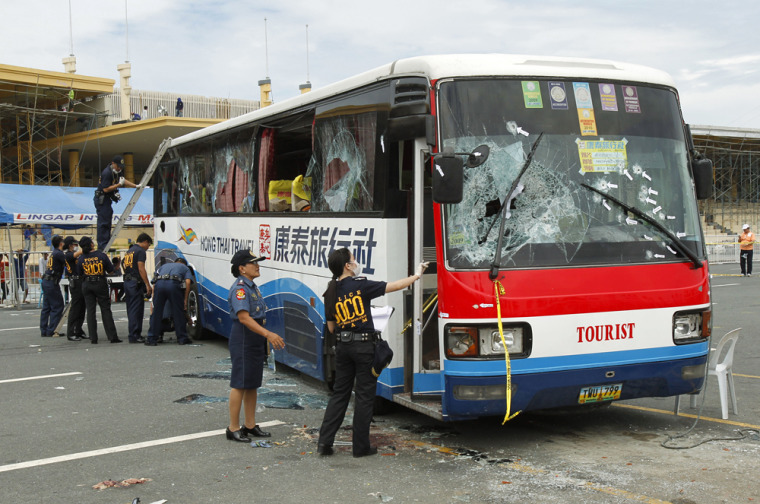The Philippines admitted on Tuesday it had bungled a hostage siege in which eight tourists were killed and which piled pressure on President Benigno Aquino to pull the country out of years of poor management and decline.
The Philippine National Police (PNP) said the assault team that tried to rescue 15 tourists from Hong Kong, held on a bus by a gunman, was inadequately trained, armed and led.
There was anger in China and Hong Kong over the chaotic rescue and demands for a thorough investigation.
The gunman, a sacked policeman who was angry at being dismissed, was killed by police. Eight of the hostages were killed, either by the gunman or in the siege, and one is in critical condition.
"In an assault to rescue hostages and save lives, the operations should be swift and precise," retired police general Rodolfo Mendoza told Reuters.
"It should be over in five minutes, but what we saw was comical," added the former intelligence and counter-terrorism officer about the rescue operation that lasted over an hour.
Hong Kong advised residents not to travel to the Philippines, and China's Global Times tabloid, run by Communist Party mouthpiece, said the botched rescue reflected a deeper malaise.
"The Philippines is one of the most chaotic countries in Southeast Asia," the newspaper said. "A culture of colonization, autocracy and rapid changes in government have created all sorts of curious grievances in this country."
The son of two heroes of Philippine democracy, Aquino swept to power partly on hopes that his family's reputation for honesty could arm him to take on corruption, boost the economy and restore the country's reputation.
Inadequacies abound
Corruption and poor governance thwart efforts to improve government finances, develop much-needed infrastructure and equip security forces properly.
The problems facing the nation, where the World Bank says around a third of the population live in poverty, are many: insurgencies by Muslim separatists and Maoists, clan wars and criminal gangs and ease of access to guns are big security risks.
The hostage-taker was armed with a M-16 assault rifle, small firearms and grenades. Assistant professor Bryan Wong, of Hong Kong's Chinese University, said he was an example of another problem in the Philippines: police involvement in crime.
"This kidnapping thing or taking hostages involving policemen have been regular issues in Philippines society locally. There are regularly Chinese businessmen being kidnapped by people, often with police involvement," Wong said.
One immediate concern was a potential drop in tourism, even as the government looks to create jobs by doubling tourist numbers to 6 million a year.
Nearly 122,000 people from Hong Kong and China visited the Philippines in the first five months of 2010, up 24 percent from a year earlier, accounting for about 10 percent of tourists.
"On the country's efforts to attract big ticket investment, I don't see any direct impact yet, but some executives would start thinking of their own personal security given what had happened last night in the bus assault," said Earl Parreno of the Institute for Political and Electoral Reforms.
The police said its command group noted "some observations and defects" in handling the crisis, including "inadequate training and competence of assault team leader" and "inadequate capability, skills, equipment and planning of the assault team." Other issues included poor handling of hostage negotiations, side issues and events that agitated the hostage-taker, improper crowd control and a breakdown of media relations procedures in a hostage situation, which was beamed live by global news networks.
Aquino rang Hong Kong Chief Executive Donald Tsang on Tuesday, after Tsang had criticized the rescue and said the Philippine president had not contacted him or returned his call.
